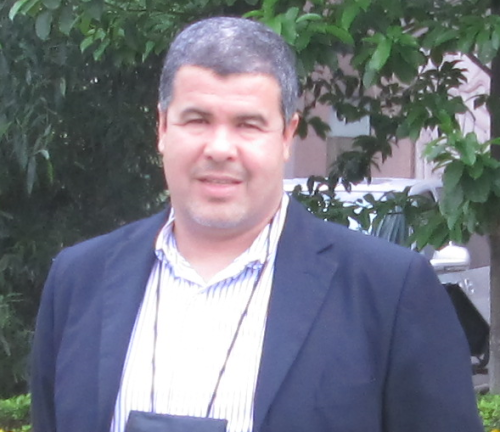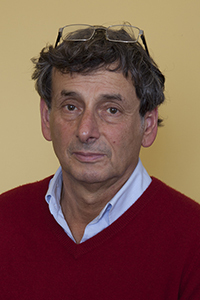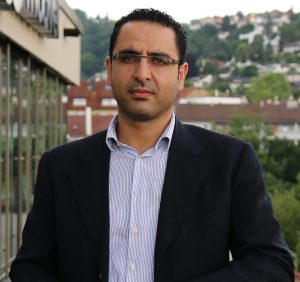_____________________________________________
Professor Panos Liatsis
The Petroleum Institute
Department Chair
Professor Panos Liatsis has a Diploma in Electrical Engineering from the University of Thrace in Greece and a Ph.D in Electrical Engineering and Electronics from the Control Systems Centre at the University of Manchester (UMIST). He commenced his academic career at the University of Manchester, before joining City University, where he was a Professor of Image Processing and the Head of the Information Engineering and Medical Imaging Centre. Panos is currently the department chair of Electrical Engineering at Petroleum Institution (UAE). He is the author/co-author of over 150 research publications in international journals, book chapters and conference proceedings. He was the Programme Chair of the 9th International Conference in Systems, Signals and Image Processing, and is involved in the Programme Committees of various IEEE/EURASIP conferences, in the areas of image and signal processing. He has over 20 years expertise in the development of advanced sensors, pattern recognition and intelligent systems, with focus on medical imaging.
He is a member of the Peer Review College of the Engineering and Physical Sciences Research Council and regularly acts as a project reviewer and assessor on behalf of the Research Executive Agency, the Research Promotion Foundation in Cyprus and the Hong Kong Research Grants Council. He is a European Engineer (Eur Ing), a senior member of the Institute of Electrical and Electronic Engineers and a member of the Technical Chamber of Greece.
Professor Ladjel Bellatreche
National Engineering School for Mechanics and Aerotechnics (ENSMA)
Computer Science and Automatic Control for Systems (LIAS)
Prof. Ladjel Bellatreche is a Professor at National Engineering School for Mechanics and Aerotechnics (ENSMA), Poitiers, where he joined as a faculty member since Sept 2010. He leads the Data and Model Engineering Team of Laboratory of Computer Science and Automatic Control for Systems (LIAS). Prior to that, he spent eight years as Assistant and then Associate Professor at Poitiers University, France. He was a Visiting Professor of the Québec en Outaouais, Canada, a Visiting Researcher at Department of Computer Science, Purdue University, USA and Department of Computer Science of Hong Kong University of Science and Technology, China. He is also involved in Research Postgraduate Programmes in Computer Science of several Universities and Schools in Algeria (Sidi Bel Abbès, where here he got his Engineer degree from the Department of Computer Science in 1992, National High School for Computer Science, Boumerdes University, Oran University, Béjaia University, Saida University, Béchar University, etc.).
Prof. Ladjel Bellatreche has been actively involved in the research community by serving as reviewer for technical journals (IEEE TKDE, DKE, Distributed and Parallel Database Journal, JoDS, etc.) and Editorial Board Member, International Journal of Reasoning-based Intelligent Systems, Inderscience, subject area editor of the Scalable Computing Journal, Springer and as an organizer/co-organizer of numerous international and National Conferences and Workshops (DAWAK, DASFAA, DOLAP, MEDI, WISE, EDA, JFO). Some recent conferences in which he is playing or has played major roles include DAWAK, DOLAP, MEDI, WISE Workshops. In addition, he served as a program committee member for over forty international conferences and Workshops. Ladjel Bellatreche actively contributes in promoting research in Africa and Asia, where he co-supervises several students and organizes conferences and workshops (ICT-EurAsia, MEDI, CIIA, etc.)
Professor Péter Érdi
Kalamazoo College, USA
Professor of Complex Systems Studies
Dr. Péter Érdi serves as the Henry R. Luce Professor of Complex Systems Studies at Kalamazoo College. He is also a research professor in his home town, in Budapest, at the Wigner Research Centre of Physics of the Hungarian Academy of Sciences. In addition, he is the founding co-director of the Budapest Semester in Cognitive Science, a study abroad program. Péter is a Member of the Board of Governors of the International Neural Network Society, the Vice President of Membership of the International Neural Network Society, member of the IEEE Computational Intelligence
Society Curriculum Subcommittee, and among others as the Editor-in-Chief of Cognitive Systems Research. His books on mathematical modelling of chemical, biological, and other complex systems have been published by Princeton University Press, MIT Press, Springer Publishing house.
How to Play the Ranking Game?
Whether we like it or not, ranking is with us. We like ranking because it is simple and objective, and dislike because it is biased and subjective. Actually, we don’t necessarily like always objectivity, since we don’t mind if our performances, websites, businesses, organizations etc. have a better image and rank as they deserve. In the lecture several topics will be discussed:
Are college ranking lists objective?
How to rank and rate countries based on their fragility, corruption or even happiness?
How to find the most relevant web pages and patents?
Paremeter-dependence of the algorithms: Rank reversal
We all know in this room that the challenging question for the future is how to combine human and machine intelligence…
There is a website/blog to be followed: aboutranking.com
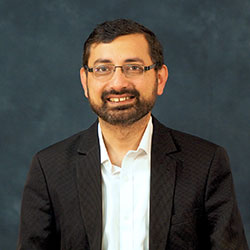 Professor Muhammad Ali Imran
Professor Muhammad Ali Imran
University of Glasgow, UK
Professor of Communication Systems
Professor Muhammad Ali Imran (M’03, SM’12) received his M.Sc. (Distinction) and Ph.D. degrees from Imperial College London, UK, in 2002 and 2007, respectively. He is a Professor in Communication Systems in University of Glasgow, Vice Dean of Glasgow College UESTC and Program Director of Electrical and Electronics with Communications. He is an adjunct Associate Professor at the University of Oklahoma, USA and a visiting Professor at 5G Innovation centre, University of Surrey, UK, where he has worked previously from June 2007 to Aug 2016.
He has led a number of multimillion-funded international research projects encompassing the areas of energy efficiency, fundamental performance limits, sensor networks and self-organising cellular networks. He also led the new physical layer work area for 5G innovation centre at Surrey. He has a global collaborative research network spanning both academia and key industrial players in the field of wireless communications. He has supervised 20+ successful PhD graduates and published over 200 peer-reviewed research papers including more than 20 IEEE Transaction papers. He secured first rank in his B.Sc. and a distinction in his M.Sc. degree along with an award of excellence in recognition of his academic achievements conferred by the President of Pakistan. He has been awarded IEEE Comsoc’s Fred Ellersick award 2014, FEPS Learning and Teaching award 2014, Sentinel of Science Award 2016, and twice nominated for Tony Jean’s Inspirational Teaching award. He is a shortlisted finalist for The Wharton-QS Stars Awards 2014 for innovative teaching and VC’s learning and teaching award in University of Surrey. He is a senior member of IEEE and a Senior Fellow of Higher Education Academy (SFHEA), UK.
Addressing Latency Challenge for IoT applications – joint RAN and Backhaul management for 5G
The talk will focus on the system level perspective of ensuring end-to-end latency in next generation cellular systems. Instead of minimising the latency with no lower bounds, a better approach is to identify the user-specific and application-specific latency requirement and then meet the target latency by optimum resource allocation. This approach requires the “learning” of the evolving capability and constraints of both radio access and backhaul networks (due to changing load scenarios) and the expectations and preferences of users and applications. The machine learning techniques and an innovative backward compatible mechanism (cell range expansion using an offset) can ensure the latency requirements and targets are met by appropriate joint RAN and Backhaul optimisation. The talk will elaborate such approaches and present some recent results and innovative methods.
INDUSTRIAL SPEAKERS
_____________________________________________
The Big Problem with Big Data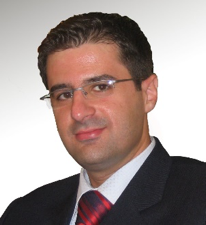
Ashraf Murtada
Head of Data Engineering & Delivery,
Deputy Director, HMRC
As a senior technology leader, Mr. Ashraf Murtada has led technology teams of all sizes, from VC-backed start-ups to enterprise scale teams, and built technical departments from the ground up. Over the course of his 18 years career in ICT, Mr. Murtada held a range of technical and leadership roles in a spectrum of industries covering Consulting & IT, Insurance, Pharma, Distribution, Media & Digital, Payments and Central Government. Mr. Murtada’s work focused on Data Architecture & Analytics; Application Development, Architecture & Cloud; Digital Strategy, Customer Experience & CRM; and Programme Management & Service Delivery. Mr. Murtada delivered high profile projects and transformation programmes to FTSE 100 banks and enterprise clients like Barclays, HSBC, Bodycote, CERN and the United Nations Development Programme.
Abstract: While investment in Big Data initiatives continues to grow year on year; return on investment has proven hard to achieve. Technologies and vendor offerings continue to mature with an ever-widening range of storage file systems, execution engines and exploitation tools. Organisations find themselves struggling to deliver value and link Big Data initiatives to business intent. Building and growing teams that are capable of handling the technical challenges brought about by Big Data while being able to deliver value at the speed of business is an unenviable task.
This talk attempts to highlight the challenges Big Data initiatives are facing with a particular focus on building capability. Can traditional BI and DW teams make the leap to Big Data and be effective? Has the technology moved us forward in our ability to scale that data sets we process but set us back in terms of team productivity? Why are organisations failing to put Big Data systems into production? How big is the shift introduced by Big Data?
Considering the pace at which the Big Data industry is evolving, a mindful look at the approaches organisations can take to align their goals, initiatives, investments and teams to deliver true and enduring business value is key.
Routing and ridematching algorithms between theory and practice
Dr. Wesam Herbawi
Daimler Mobility Services
Senior Researcher
Wesam Herbawi is a senior researcher and routing specialist at Daimler Mobility Services. His current research interests include intelligent mobility services, intermodal journey planning, ridematching for on-demand transportation and stochastic optimization of mobility related hard optimization problems. Dr. Herbawi is serving as a reviewer for several journals including IEEE transactions on services computing, IEEE Systems, Man and Cybernetics, Elsevier transportation research part B and International journal of multicriteria decision making. He was also on the program committee of different IEEE conferences including IEEE congress on evolutionary computation (CEC 2012-2014) and IEEE symposium series on computational intelligence (SSCI 2013-2014).
Abstract: During the last few years, the market has faced huge amounts of investment in the field of mobility and mobility as a service. Many startups have appeared and many automotive big players have invested in the field as a strategic direction. Routing, shortest path, and ridematching algorithms are basic components in this booming field. In this talk, as one of the pioneers in the field of ridematching and according to my industrial experience in the field of routing at Daimler Mobility Services, I will try to highlight the gap between the theory and practice in this area.



